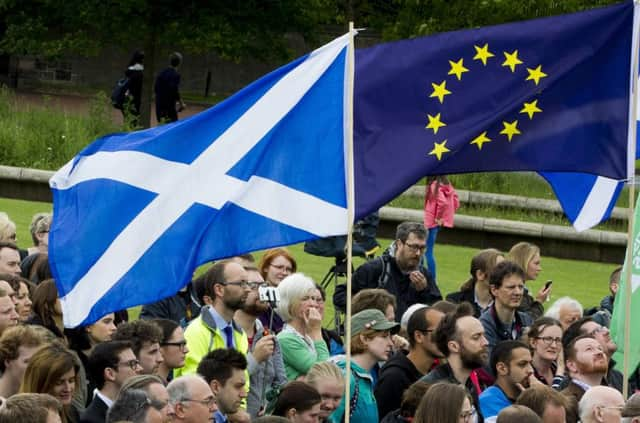Brexit one year on: how has referendum result affected Scotland?


That decision has almost unerringly dominated the political landscape since the moment the result became clear.
David Cameron resigned as Prime Minister, to be replaced by Theresa May, Boris Johnson was made Foreign Secretary, and George Osborne was shuffled off to the backbenches, and latterly, a job at a newspaper.
And that is just the changes at the top of one party.
Advertisement
Hide AdAdvertisement
Hide AdJeremy Corbyn saw off a leadership challenge, UKIP ran through a seemingly countless run of leaders, and even the SNP saw a change of Deputy.
That’s before even getting in to the small matter of a General Election gamble by Theresa May that spectacularly backfired, and the announcement of plans for a second referendum on independence called by Nicola Sturgeon.
Here are just some of the ways that Scotland has been affected by last year’s result, on its anniversary.
“Dragged out against our will”
The Holyrood elections of 2016, which took place around 6 weeks before the Brexit vote, saw the SNP lose their overall majority.
Nicola Sturgeon’s party, having to walk something of a constitutional tightrope, were keen to avoid putting another Independence referendum front and centre of their campaign.
And so their manifesto made mention of merely the possibility of another plebiscite, should there be a ‘material change’ in Scotland’s constitutional circumstances.
One of the examples given as being that material change was Scotland being ‘dragged out of the EU’.
That meant that if Scotland voted to stay, but the UK as a whole voted to leave, another referendum would find itself on the table very quickly.
Advertisement
Hide AdAdvertisement
Hide AdAs fate would have it, that’s exactly what did come to pass, with 62 per cent of Scots voting to Remain in the EU, while 38 per cent backed the Leave campaign.
Inevitable Indyref2?
Nicola Sturgeon, allegedly with her arm twisted by senior party figures, announced in March that she would be pursuing a second referendum by the end of the Brexit process.
That was mooted to be in either the Spring of 2019, or the Autumn of 2018, depending on how Theresa May’s negotiations went.
Pushback from the Conservative Government was almost immediate, with the Prime Minister’s refrain of ‘now is not the time’ being used constantly. Again Brexit was the reason mooted, with the Tories claiming that it was unfair to have a second referendum on independence based on Brexit before the impact (positive or otherwise) of that new set-up was determined.
Scotland’s parliament voted to authorise the First Minister to seek permission for her plebiscite, but political reality meant that any decision still ultimately rested with the Prime Minister.
Their official rejection of that plea was fronted by Ruth Davidson, a staunch Remainer who now appeared to be singing from the same Brexit hymn sheet as her party’s leader, who had undergone a similar Damascene conversion.
Shock election, shock results
Mrs Sturgeon’s Spring surprise was trumped by Theresa May’s, when the Prime Minister announced her plans for a snap General Election.
The Brexit deal was front and centre of Mrs May’s “strong and stable” offer to the British people, and by consequence the touted independence referendum was front and centre of the campaign in Scotland.
Advertisement
Hide AdAdvertisement
Hide AdAll three of the main unionist parties put opposing Ms Sturgeon’s plans at the heart of their pitch to voters, and all three parties gained seats from the SNP.
Once again, Brexit overtook events as even MPs with large majorities who might have expected to be in office for a number of terms found themselves collecting P45s from the electorate.
Now, Theresa May, stripped of a parliamentary majority, has to take what remains of her authority and negotiate with the remaining EU leaders.
Nicola Sturgeon is facing what is, by the SNP’s standards, an uncharacteristic amount of internal bickering on the way forward for the independence movement.
All the while, an economic cloud hangs over Scotland, and the UK, as dire warnings about the impact of Brexit on individual industries continue to circulate.
Scotland, along with the rest of the UK, has irrevocably changed, in just one year. That change will only accelerate as Brexit is realised.
